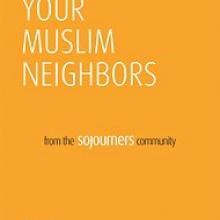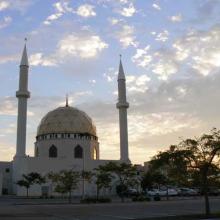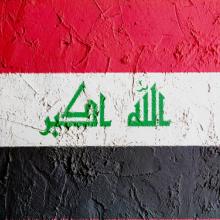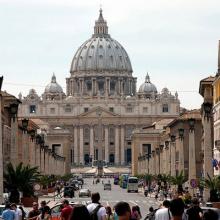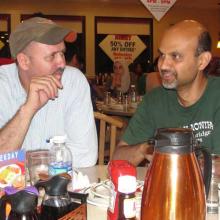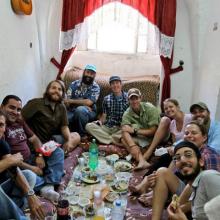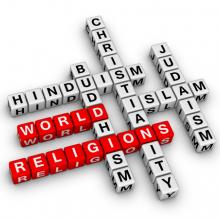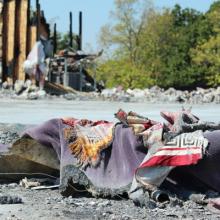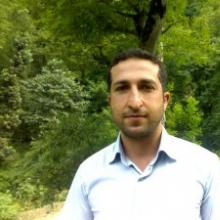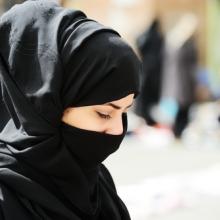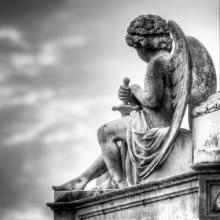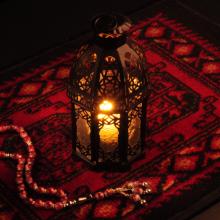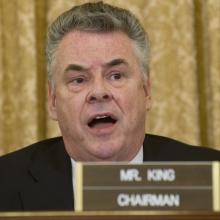Muslim
The racist, anti-Muslim ad in the New York Subway that used the language of civilized and savages has more than met its match.
A large group of Jews and Christians have countered that hateful message by tapping into the rich mines of neighborly love that are at the heart of Jewish, Christian, and Islamic traditions.
New ads by Rabbis for Human Rights , United Methodist Women, and Sojourners have tapped into the rich religious commandment to “love thy neighbor” to remind all of us to love our neighbors.
TOLEDO, Ohio — Muslim worshippers are reeling from an arson fire at the Islamic Center of Greater Toledo, but are grateful for an outpouring of support from the local interfaith community.
“All the support we get is very welcome because if you are going through a tragedy and you have a friend who is holding your hand it means a lot,” said S. Zaheer Hasan, a spokesman for theUnited Muslim Association of Toledo.
Perrysburg Township police ruled that the Sept. 30 fire was arson. Surveillance footage from the mosque shows a “person of interest” — a white middle-aged male wearing a camouflage sweatshirt and hat — at the mosque’s entrance shortly before the fire, which was reported about 5 p.m.
Mahjabeen Islam, president of the Islamic Center, said the suspect poured gasoline in the center of the main floor where men worship at the mosque. Women pray on the same main floor, but in an area separated by a low divider.
“It was set in the men’s prayer area and the sprinklers turned out the fire. There is a lot of water damage from the sprinklers,” Islam said. “The Islamic Center is uninhabitable for easily three months.”
A man who assaulted two men because he thought they were Muslims and was then ordered to write a report on the cultural contributions of Islam has a new assignment — to write a report on the history of Hinduism.
Bay County Circuit Judge Joseph K. Sheeran on Monday sentenced Delane D. Bell, 26, to two years of probation, with the condition that he pen a 10-page report on Hinduism, the world’s third largest religion.
Last March, Bell pleaded no contest to a two-year felony count of ethnic intimidation, stemming from an incident that occurred on Nov. 26, 2011. At that time, Bell was standing outside a bar when he yelled “jihad” and “Osama bin Laden” at two men of Indian descent. He then punched one of the men and struck the other’s car.
When Bell entered his plea, Sheeran ordered him to write a 10-page report on “the greatest accomplishments of Muslims.”
It takes a lot for me to get excited.
Maybe I'm cautious, or maybe I'm just a tough sell, but it takes a big something to get me on board.
Today was that big something.
Last week, Pamela Geller of the Freedom Defense Initiative and Stop Islamization of America, put up ads in New York City subway stations that read, "In any war between the civilized man and the savage, support the civilized man. Support Israel. Defeat Jihad."
Well, I think that's a problem. And Sojourners thinks that's a problem.
Our world is a powder keg, and Geller flagrantly lit a blowtorch with these ads, which, in case you were wondering, are protected fully under the Constitution.
They may be legal, but they're not moral.
Just one week after Pope Benedict XVI ended his successful visit to Lebanon, the country's most senior Catholic leader called for a United Nations resolution “that will ban denigrating religions.”
Meanwhile in Pakistan, the country's only Catholic cabinet member, Minister of Harmony Paul Bhatti, this week told an interfaith gathering in Lahore that he will press U.N. Secretary General Ban Ki Moon to pass a UN resolution that condemns "defamation and contempt against religions." Bhatti said "we must not allow anyone to break our harmony" between Christians and Muslims.
Both moves are understandable in light of increasingly popular efforts in predominantly Muslim countries to outlaw blasphemy or defaming religion. But they could prove problematic for the Vatican as it fights to protect the rights of Christian minorities around the world.
The debate suggests a widening gap between the Vatican's official position, which opposes such measures, and the day-to-day reality of Catholic leaders on the ground, who often feel compelled to support Muslim efforts to protect religious tenets and religious figures from defamation.
Members of the Syrian opposition generally want a democratic government that protects the rights of minorities, though many also want a constitution based on Islam, according to a recent survey.
Their aspirations are important because the Obama administration has said it is refraining from arming the opposition, which has been pummeled by Syrian security forces for 18 months, in part out of fear of igniting sectarian violence. There's also fear that weapons would reach Islamist radicals who would threaten allies in the region.
The survey by the International Republican Institute, which trains democracy activists around the world, found high support for a government that "respectfully acknowledges religion" and treats all religions equally. The second-most popular model of choice was for a constitution "based on Islam."
"Most of the opposition is Sunni Muslims and they are democratically minded, but they want a government based on some kind of Islamic law or that follows Islamic guidelines," says Elizabeth O'Bagy, an analyst at the Institute for the Study of War who helped the survey writers find contacts in the opposition movement.
Muslim immigrants to America frequently worry whether their children will be able to maintain their Islamic identity in a country with a reputation for rampant vice and promiscuity. Many respond by limiting their children’s social contacts to school, family, and mosque.
But that approach can backfire, some Muslim family experts say. While they advise parents to help their children make Muslim friends, they also say Muslim kids can — and should — fully participate in American culture without compromising their Islamic values.
It’s a formula that’s worked for generations.
Farhat Husain was 23 when she left Pakistan in 1964 for England, where her husband received his Ph.D. at Oxford. Her daughter was born there in 1967, before the family moved to New Haven, Conn., in 1969, then to the Boston area in 1971. Her son was born there in 1976.
Both she and her husband were practicing Muslims and well-educated, and wanted the same for their children. She became involved in the international clubs at the universities where her husband worked — cooking for potlucks, manning information booths and presenting about Islam at churches, community centers, and her children’s schools.
My heart is heavy.
Every day for the last week, media outlet have told their version of the current uprising stretching across the Middle East (Egypt, Libya, Yemen). Whether it’s pictures of embassies burned to the ground, rioting citizens, or highly politicized comics, the surge of content has been anything but “feel-good” and hopeful.
And that’s because the events and corresponding responses have been anything but “feel-good” and hopeful.
My heart breaks because I know the events that are unfolding do not represent the majority of those who inhabit the Middle East. I spend a significant amount of time in there and have built deep, life-long friendships.
Just two weeks ago I sat around a table and shared a meal with Christians, Jews and Muslims in the home of a devout Muslim family in the region. A day after that, I served alongside Muslim youth workers who are promoting non-violence and reconciliation in the face of oppression and poverty.
On the same day, I sat with an Arab Christian who embodied Jesus’ teaching in the Sermon on the Mount in dealing with daily injustice by saying, “We refuse to be enemies.” Lastly — and what keeps playing over and over in my head — are the words spoken to me by a Muslim friend named Omar who said,
“Please give this message to all of your American friends. We (Arab Muslims and Christians) desire peace. The violence you see in the news does not represent us. It is not the majority, it is the smallest minority of extremism. Please listen to our story and accept our friendship.”
Muslim and Coptic Christian leaders in the U.S. are pledging not to let a spate of violent protests in some 20 Islamic countries derail recent efforts to improve the sometimes troubled relations between the two communities.
On Sept. 18, the Egyptian government ordered the arrest of seven Egyptian-born Copts now living in the United States who were allegedly involved in an anti-Muslim film that portrayed Islam's Prophet Muhammad as a bumbling sexual pervert.
“We cannot allow the actions of a few deceived fanatical individuals to define our communities,” said Bishop Serapion, head of the Los Angeles Diocese of the Coptic Orthodox Church, speaking during a press conference on Sep. 17 with Muslim leaders in Los Angeles.
“We call on members of both religions to lean on our faiths to counter the hate and the violence with good speech and positive work,” added the Egyptian-born bishop.
The show of solidarity comes almost a week after protesters in Egypt, where about 10 percent of the 90 million Egyptians are Coptic, attacked the U.S. embassy, setting off protests in other Muslim countries, including neighboring Libya, where American ambassador Christopher Stevens and three other Americans were killed.
Worshippers at Toronto's Salahuddin mosque were bracing for protests Friday as part of "Walk Your Dog in Front of a Mosque Day."
The event is being organized by supporters of a man who claims Muslim protestors kicked his English mastiff, Cupcake, during an anti-Israel rally last month.
While claiming that they wanted to draw attention to Muslim attitudes toward dogs, the organizers' Facebook page is replete with hostilities. One man wrote that he would throw protestors into a "lake of fire" and shoot their dogs, and the event has been promoted on a white supremacist website, StormFront.org.
Some Muslims responded with their own "Good Muslims Love Dogs" Facebook page, including at least one photo of a veiled woman with a veiled dog.
Muslims' alleged canine-phobia is often cited by critics of Islam as an example of how the faith is incompatible with Western values. Some Muslims have perpetuated that narrative, such as when a Somali cab driver in Minneapolis made national headlines in 2007 when he refused to let a blind man bring his seeing-eye dog into his car.
Yet many Muslims all over the world have dogs, and dogs figure prominently is some Islamic countries, such as Turkey, famous for its Kangal and Akbash breeds.
The typical American underestimates how many Protestants there are in the U.S., and vastly overestimates the number of religious minorities such as Mormons, Muslims, and atheist/agnostics, according to a new study.
Grey Matter Research and Consulting asked 747 U.S. adults to guess what proportion of the American population belongs to each of eight major religious groups: Protestant, Catholic, Jewish, Mormon, Muslim, atheist/agnostic, believe in God or a higher power but have no particular religious preference, and any other religious group.
The average response was that 24 percent of Americans are Catholic, 20 percent are Protestant, 19 percent are unaffiliated, 8 percent are Jewish, 9 percent are atheist or agnostic, 7 percent are Muslim, 7 percent are Mormon and 5 percent identify with all other religious groups.
When the mosque in Joplin, Mo., on the outskirts of town burned to the ground on Aug. 6, the imam’s 4-year-old son knew what to do.
He wanted to build another.
After all, that’s what his family had done with their home after it was destroyed by the tornado that tore through the town a little more than a year earlier.
The imam's family has a new home, but the wait for a new mosque is going to take a while.
A little more than a month after the Islamic Society of Joplin mosque was destroyed by fire, the local Muslim community is moving forward with support from the interfaith community.
But progress is slow.
Religious rights activists are hailing the release over the weekend of an Iranian pastor accused of apostasy and a Pakistani girl who was charged with blasphemy.
Pastor Youcef Nadarkhani was released on Saturday after a six-hour hearing, reported the American Center for Law and Justice, which worked to garner American support for the minister’s release. The Christian convert had faced possible execution.
“Your prayers, your advocacy, and your voice has been heard,” read an online announcement from ACLJ.
The U.S. Commission on International Religious Freedom welcomed Nadarkhani’s release “after being unjustly imprisoned for three years because of his faith,” said its chair, Katrina Lantos Swett.
According to a report late Friday from Christian Solidarity Worldwide, an international organization devoted to issues of religious freedom, Pastor Youcef Nadarkhani, a Muslim convert to Christianity who has been imprisoned by the Iranian government since 2009 on apostasy charges, has been acquitted and released from prison.
Nadarkhani, 35, previously had faced a possible death sentence for the charges against him, a result of his prostelytizing Muslims to convert to Christianity. He also refused to deny his Christian faith to save himself from execution.
Since his detainment three years ago, the U.S. State Department, the British government, the Vatican, Amnesty International, and a host of Christian organizations and leaders — including South Africa's Archbishop Desmond Tutu — have called on the Iranian government to release the young pastor.
LOS ANGELES—The ACLU is suing The Walt Disney Co. on behalf of a Muslim woman who claims the company discriminated against her by not allowing her to wear a headscarf while working in a Disney restaurant in Anaheim.
Former Disney employee Imane Boudlal worked at the Storytellers Cafe at the California Adventure park, directly across from Disneyland. In 2009 she requested to wear her hijab while working. The ACLU claims that two months later, Disney supervisors denied her request, allegedly due to Disney policies on employee uniforms.
Managers, however, say they worked with Boudlal on several uniform options including one involving a hat, in keeping with the restaurant’s style, to be worn over her hijab.
I’m on day 14 of my Ramadan fast — almost the halfway point. My schedule has been so scattershot with travel that I haven’t been able to make it to a mosque yet. Nonetheless, lightheadedness brought on by lack of water and sleep has become my new normal.
I asked Daisy Khan, Imam Feisal’s wife and the Executive Director of the American Society of Muslim Advancement: “What about sleep? How do people do it?” She explained, during Ramadan we live like angels. Angels don’t need sleep. They don’t need food or water.
“But how do they do it, physically?” I pressed.
“Spiritual energy,” Daisy said.
Americans cheered when Aly Raisman of Needham, Mass., won a gold medal on Tuesday in the women’s all-around gymnastics competition, but at least some American Jews likely cheered a little louder.
“For people who are part of a minority, to see one of your own have this international recognition gives you enormous satisfaction and pride,” said Rabbi Keith Stern of Temple Beth Avodah in Newton Centre, Mass., where Raisman has worshipped since childhood. “It lets you say, ‘Look at what we’ve managed to do.’”
Members of minority faiths in the U.S. — Jews, Muslims, Hindus and Sikhs — are rooting for U.S. Olympians and also saving a few extra cheers for their co-religionists, both Americans and athletes from other teams. Before they go to bed or when they wake up, they scan lists of medal winners and competition results, looking for names that might sound Jewish, Muslim, Hindu or Sikh.
But why?
In a sense, religion isn't supposed to matter in who a fan roots for, said Harold U. Ribalow, author of three books about Jewish athletes, trying to answer that question. But, he added, the evidence was overwhelming that people like to see those from their own groups do well, especially in the root-for-the-underdog world of sports.
EDITOR'S NOTE: Ramadan's first day of fasting began today at dawn. This year, Sojourners' Director of Mobilizing, Lisa Sharon Harper, has chosen to keep the fast during the Muslim holy month alongside our friend, Imam Feisal Abdul Rauf. Both Lisa and Imam Feisal will be blogging regularly during the coming days and weeks of Ramadan, sharing with our readers their personal reflections on what the holy month, the fast and journeying together as a Christian and a Muslim means to them. To learn more about Ramadan and its sunrise-to-sunset monthlong fast, click HERE.
LISA SHARON HARPER:
In 2004 I led a group of Intervarsity students on a journey through Croatia, Bosnia, and Serbia on a Pilgrimage for Reconciliation. For four weeks we traveled throughout all three countries investigating the roots of conflict and seeds of peace being planted between the Catholic Croatians, Muslim Bosniaks, and Orthodox Serbs. Along the way, we met with Miroslav Volf, who was vacationing in his home country of Croatia at the time. One of my students asked Volf the same question I asked my mentor years before: “How do you engage in interfaith activity without watering down your own faith?” Volf answered with one word: “Respect.”
He explained that Jesus says the greatest commandment is to love God and to love our neighbors as we love ourselves. Love requires respect. We may not agree with our neighbors, but we must respect their minds and their ability to choose the faith they will practice...
That is why I have chosen to embrace my Muslim neighbors by practicing the Fast of Ramadan this year with a spiritual leader who I admire and look forward to learning from, Imam Feisal Abdul Rauf.
Ongoing violence in Nigeria has exacerbated tensions between the country's Muslims and Christians. Nigeria has equal numbers of Christians and Muslims, and 92 percent of the country's population says they pray every day, according to a 2010 poll by the Pew Forum on Religion & Public Life.
Hundreds of Christians and Muslims have died this year alone, including scores killed last weekend (July 7-8) when Muslim militants attacked Christian villages in the nation’s central plateau, where the mostly Muslim north and the mostly Christian south meet.
Read five things you should know about the violence in Nigeria inside the blog...
House lawmakers split along party lines at a hearing on June 20 meant to gauge Muslim responses to earlier hearings on the “radicalization” of American Muslims.
Testimony by four witnesses was overshadowed by Republicans who defended the four prior hearings and Democrats who questioned whether they were misguided or actually harmful to Muslim Americans.
Short on new data but long on rhetoric, lawmakers argued both sides of the same statistics and relied heavily on anecdotes.
“The overwhelming majority of Muslim Americans are outstanding Americans, yet the reality is that the Islamist terror threat comes from the community,” said Rep. Peter King, R-N.Y., who chairs the House Committee on Homeland Security.
